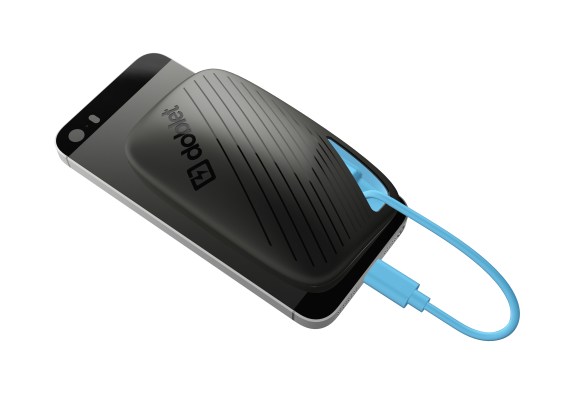We’ve all been there. You’ve been out all day and suddenly that low battery alert pops up on your phone.
If you’re lucky, the bar you’re at might have the right charger for your phone behind the counter. If you’re not, you’re walking or taking the bus instead of calling a car service.
But with Y Combinator-backed Doblet, you might be able to get a charge even when you don’t have an outlet. The startup is putting portable batteries that charge Android and iPhone 5 phones in bars, restaurants and coffee shops. Users have the option of paying either $3 for a single charge or $30 for an annual subscription to the service and unlimited charges.
To use Doblet, you download an app for iOS or Android that shows you where the nearest charging vendors are. Then you ask for a charger, and you’ll get the portable battery device. You then pay for the Doblet service on the app, and you’re free to move around with your Doblet and bring it back at a later time.
Gurson joked that Doblet was the realization of Stephen Colbert’s dream of ambient phone charging, a project he suggested when Elon Musk appeared on his show in July.
“I would have a subscription service to a charging system, and that anywhere I went in the United States, there would be a charge that would follow me around,” Colbert joked.
Musk said we’ll do it, but it seems Jeff Chang and Doktor Gurson have beaten him to it.
Doblet soft-launched at three locations this weekend, but by the end of September, the founders expect it to be available at about 50 San Francisco locations.
The co-founders tell me when the service first launches, they’ll even come get the Doblet from you if you’re at another location in San Francisco.
Chang and Gurson both took unique paths to Y Combinator. Chang skipped several years of school and graduated from New York University School of Medicine at just age 20. He previously worked as a radiologist and most recently completed graduate studies artificial intelligence. Gurson describes himself as a “serial entrepreneur,” and previously worked in web hosting startups.
Gurson told me he first got the idea for Doblet when a man with a dying phone approached him in a bar and asked him if he had a charger. Gurson said only if you give me $2. The man laughed and walked away, but later that night Gurson saw him again and he said he ended up spending $15 on a new phone charger.
“He came up to me later and said he definitely should have given me $2,” Gurson said.
Even though I’m constantly killing my own phone battery, I was skeptical of the $30 annual subscription fee. That’s around the same cost as buying your own portable battery, and you can always just throw your phone charger in your bag for free. But Chang and Gurson of Doblet say their technology sets itself apart because often people forget those additional devices or don’t remember to charge spare batteries or charging cases. In my personal experience, they’re right.
They also say it differs from existing services like the stands at airports or the lockers available at some retail stores that let you charge your phone because you can move around with a Doblet and use your phone while it’s charging, rather than being tied to a stand or leaving your phone in a locker to charge.
The location-based app that shows users where to find nearby vendors offering the service when their phones are dying could also drive new customers to bars and restaurants. Businesses additionally receive a cut of the profit Doblet makes when they have it available to their customers.
Hopefully the next time my battery starts to die, Doblet will be around.
